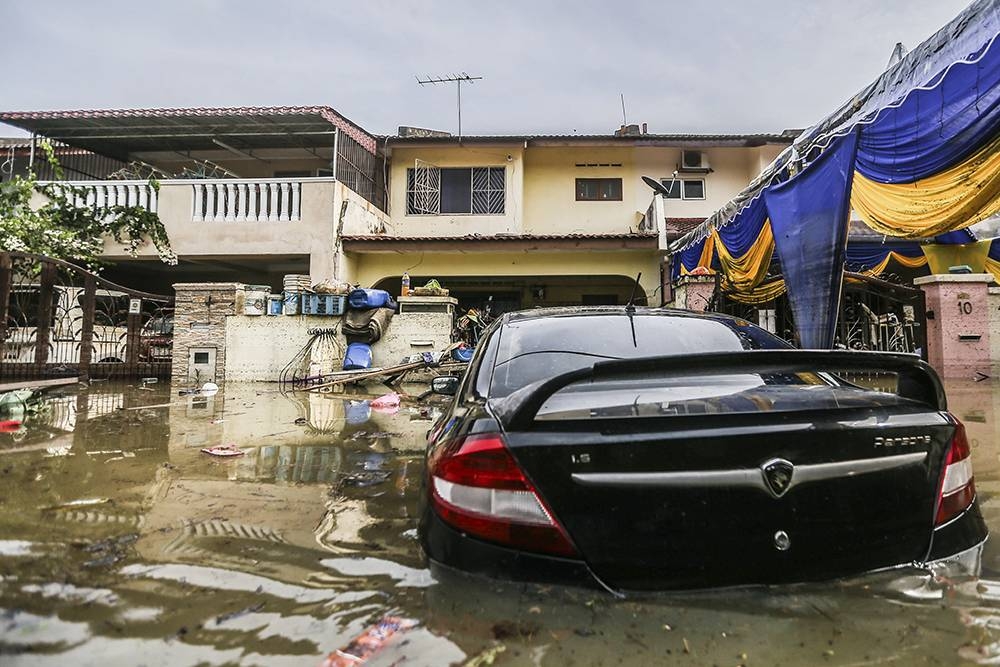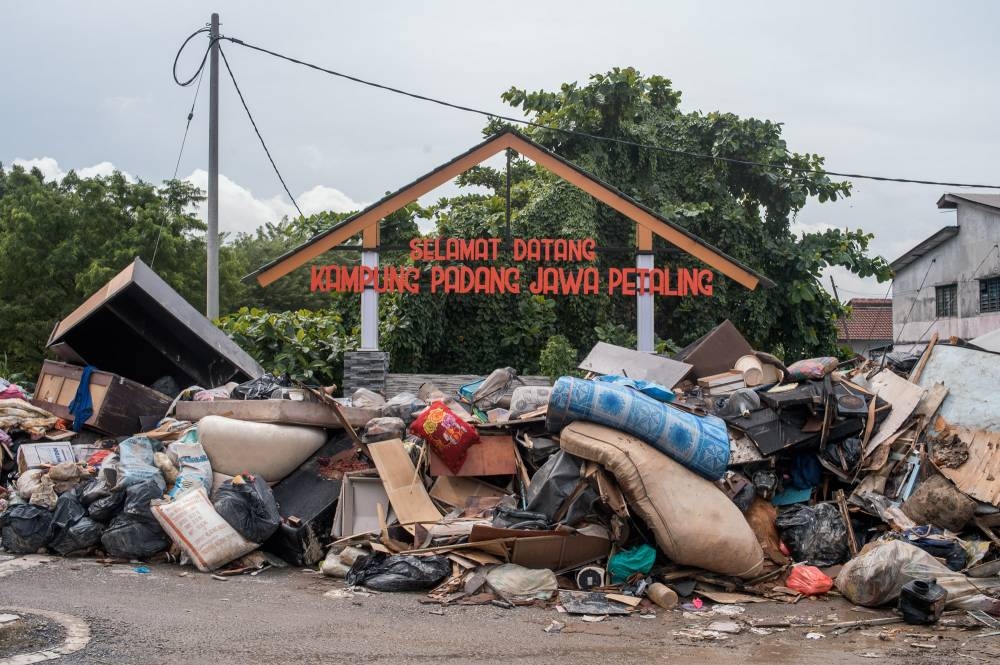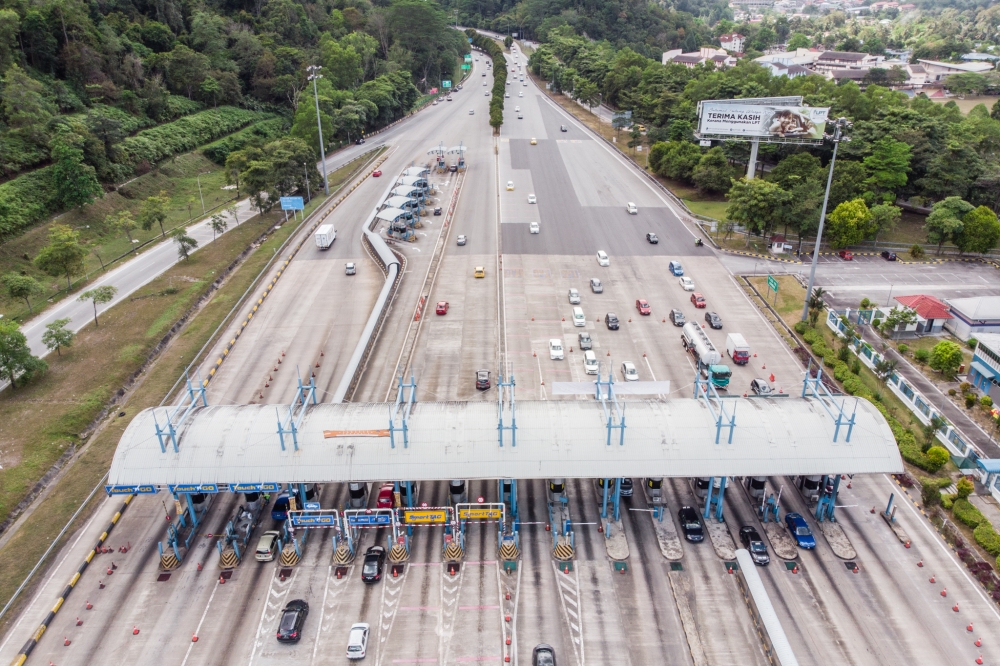KUALA LUMPUR, June 27 — Fifty residents of Taman Sri Muda in Shah Alam, Selangor, have sued the Malaysian government and nine others seeking more than RM3.7 million in compensation over the massive floods that inundated their neighbourhood last December.
In the lawsuit filed in the High Court in Shah Alam on June 22, the residents named as respondents the director-general of the Natural Disaster Management Agency (Nadma), the minister in the Prime Minister’s Department, the director-general of the Malaysian Meteorological Department, the minister of environment and water, the director-general of the Department of Irrigation and Drainage, the Shah Alam City Council, KDEB Waste Management Sdn Bhd, Tenaga Nasional Berhad, the Selangor state government, and the government of Malaysia.
The residents are claiming for special damages totalling RM3,767,148.51 from the 10 defendants jointly and separately, general damages to be assessed by the High Court, and aggravated damages.
The 50 residents claimed to have suffered losses amounting to over RM3.7 million as a result of alleged breaches and negligence of the 10 respondents.
This sum is based on a table of the amount of loss each resident had suffered in any of the 21 categories, namely goods and commodities, medical reports, surgeries and consultations, medications, vehicles, clean-up cost, income loss due to absence at work, replacement of minor utensils, vehicle repair costs, property repair costs, business activities due to shut down, value of totally destroyed material, replacement of pumps and pipes, erosion of agricultural soil and destruction of harvest, damage to livestock or pets, veterinarians’ cost, loss and repair of electronic devices, cost for network disruptions, reduced wages, alternative accommodation and others.
As for the general damages and aggravated damages that the residents are claiming jointly and severally against the 10 defendants, these are for intangible losses, including but not limited to the “pain and suffering, emotional distress and mental anguish” that they had suffered.
Lawyer V. Vemal Arasan, who is representing the group, said they had approached Ipoh Barat MP M. Kulasegaran who had then engaged lawyers to handle this case.
Vemal told Malay Mail that he and Datuk Gurdial Singh Nijar have been engaged as counsels while the law firm Tanes, Khoo & Paulraj led by lawyer James Joshua Paulraj are acting as solicitors, and all were acting on a pro bono basis.
He said that another group of residents in Klang represented by the same team of lawyers plan to file a similar lawsuit with the High Court in Klang.
Vemal said the lawsuit by these 50 Taman Sri Muda residents is currently scheduled for case management on July 25.

In a statement of claim sighted by Malay Mail, the 50 residents said the Taman Sri Muda township is prone to flooding as it is surrounded by the Klang river on three sides and downstream from the confluence between the Klang river and the Damansara river, while the adjoining areas had undergone aggressive expansion leading to the development of Taman Iswara, Desa Kemuning, Kemuning Utara, Kemuning Baru and Taman Kemuning Utama.
After the first major floods in Taman Sri Muda in December 1995 when floodwaters exceeded a metre, a retention pond measuring about three hectares was built nearby while a network of drain and irrigation canals were also created to divert rainwater into the Klang river.
Taman Sri Muda’s flood mitigation measures involved the drains collecting water from houses and flowing into larger drains and then into irrigation canals.
The water then flows directly into the Klang river through a tidal gate or flows first into a retention pond to store the water until a suitable time for pumping into the Klang river, depending on whether the tide in the Klang river is higher than the water level in the canals and whether the tidal gate is opened.
But Taman Sri Muda still experienced flooding each year as the drainage system built for this township was also used to handle water from surrounding neighbourhoods such as Kemuning Utara, Kemuning Baru and Kota Kemuning and other upstream places, with the frequency of such annual floods in Taman Sri Muda becoming worse since 2019.
The residents said the Selangor state government had in 2007 allocated around RM3 billion to build a 17-km long canal known as the Canal City project to help address the floods in Taman Sri Muda, but this was cancelled in 2010 or early 2011, and that the residents’ plea in letters to the relevant authorities such as the Department of Irrigation and Drainage and the Shah Alam City Council had not resulted in any action being taken.

Apart from seeking compensation of over RM3.7 million, this group of Taman Sri Muda residents also sought multiple court declarations against the respondents.
Among other things, the residents want the courts to declare that the Nadma director-general had failed to implement natural disaster management — as outlined in the National Security Council’s Directive No. 20 which was revised on March 30, 2012 — effectively and in a timely manner in relation to the December 2021 floods at Taman Sri Muda, as well as a declaration that this directive is ineffective in dealing with current circumstances relating to natural disaster management.
The residents are also asking the court to declare that the director-general of the Malaysian Meteorological Department had failed to effectively the current storm and weather conditions which led to the flood at Taman Sri Muda and failed to warn the residents there about the bad weather which led to the floods and its potential disastrous consequences in an effective and timely manner, and that the department had also failed to ensure fast and accurate information being given to response agencies.
The residents also want the court to declare that the director-general of the Department of Irrigation and Drainage had wrongfully allowed Taman Sri Muda’s drainage system to be overloaded which had then caused or worsened the floods, as well as declaration that the department’s director-general had failed to ensure stormwater management requirements were complied with before granting approvals for new development projects in and surrounding Taman Sri Muda.
The residents also want a declaration that the Department of Irrigation and Drainage director-general had failed to repair or replace defective water pumps that were installed to bypass the tidal gate and force water into the Klang river.
According to Taman Sri Muda residents, the township’s drainage and irrigation system was overloaded and could not cope with the rainfall volume in December 2021, as new projects in the surrounding Kota Kemuning area were allowed to “piggyback” on Taman Sri Muda’s drainage system to divert rainfall into the Klang river instead of being required to build new drainage networks.
“This means the system designed to cater to Taman Sri Muda now had to deal with the water from much of the surrounding areas, which as estimated is at least triple the volume it was designed to handle,” the residents said, which meant irrigation canals, drains and the retention pond would overflow and spill over into the township.
“While there are pumps installed to bypass the tidal gate and force water into the Klang River, these can only deal with so much water. Again, these were put in place to deal with Taman Sri Muda’s water, not everyone else’s,” the residents said.
The residents also sought for court declarations that the Shah Alam city council had failed to ensure proper construction of drainage and failed to correct defective or inadequate drainage system there, and that the city council had failed to implement safeguards in a proactive manner for Taman Sri Muda which is well known for being susceptible to floods.
The residents also want the court to declare that the city council had failed to take into account matters linked to stormwater management and drainage capacity before approving development projects in and surrounding Taman Sri Muda.

The residents are asking the court to declare that the KDEB Waste Management Sdn Bhd had failed to regularly clear Taman Sri Muda’s drains of debris, rubbish, dried leaves, silt and dirt and failing to implement silt traps in these drainage to prevent build up of silt, and that the company had failed to implement an action plan for rubbish cleanup in the event of floods at the flood-prone Taman Sri Muda and that this has resulted in the delay in clearing the rubbish.
According to Taman Sri Muda residents, the township’s streets were left with a buildup of furniture and rubbish rotting in stagnant water together with silt in the aftermath of the floods, with only 35 per cent of such rubbish cleared by KDEB by December 30 and that the company allegedly took several months to clear such rubbish, noting that this posed a public health risk as the contaminated water could cause infections and infectious diseases and become breeding grounds for mosquitoes.
The residents also sought for the courts to declare that TNB had failed to have a contingency plan in the event of failure of power supply for sluice gates and pump units and which led to delay in portable generators being provided to ensure these could operate again, and a declaration that the company had failed to implement a manual or hydraulic override for the sluice gates and to provide portable generators to prepare for any potential power supply issues.
The residents also want a declaration that TNB had failed to take the relevant steps for its substations — which provide electricity for the sluice gates and pump units — to ensure there are no power failure during floods, and a court order to compel TNB to implement a manual or hydraulic override for the sluice gates and to ensure no repeat of power supply issues.
When the December 2021 floods happened, TNB cut off power supply to Taman Sri Muda — including electricity supply to the sluice gates which required electricity to drain the Taman Sri Muda retention pond of water to be channelled to the Klang river.
“If the sluice is unable to be opened, floodwater will cause Taman Sri Muda to become a giant retention pond, with stagnant water unable to be drained to the Klang River. However, the sluice gates cannot be operated without an electricity supply from the grid, provided by TNB,” the residents explained, noting that a TNB power substation that sank during the floods caused pump units at the Taman Sri Muda to also be shut down due to lack of power supply.
There was a delay of about four to five days before portable generators were brought in by TNB, and that it was after these generators were made available that the sluice gates and pump units could become operational again, and which was when the floodwaters then started receding, the residents said.



















